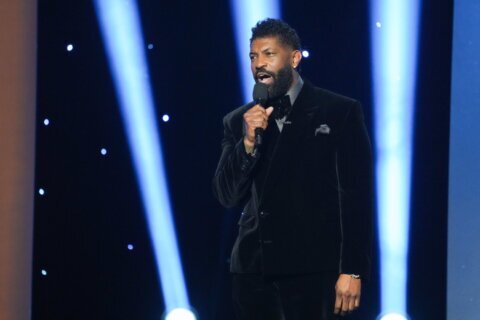WASHINGTON — When director Steven Soderbergh announced his retirement after his Emmy-winning TV movie “Behind the Candelabra” (2013), the film community mourned the loss of the consistent eye behind “Sex, Lies & Videotape” (1989), “Erin Brockovich” (2000), “Traffic” (2000), “Ocean’s Eleven” (2001-2011), “Contagion” (2011) and “Side Effects” (2013).
But the news was met with a skeptical, “I’ll believe it when I see it,” suspecting that such a creative mind would eventually get the itch. (Here’s looking at you, Daniel Day-Lewis.)
And so, just four years later, Mr. Soderbergh comes out of retirement with “Logan Lucky,” a capable comedic caper that might not be his A-game but is still never less than amusing.
It follows North Carolina roughneck Jimmy Logan (Channing Tatum), who’s laid off from his mining job due to a pre-existing condition. He returns home to his native West Virginia to spend more time with daughter Sadie (Farrah Mackenzie), ex-wife Bobbie Jo (Katie Holmes) and brother Clyde (Adam Driver), a one-handed bartender due to an Iraqi roadside bomb.
One night, while drowning their sorrows at the local watering hole, Jimmy hatches a scheme to pull off a heist during a NASCAR race at the Charlotte Motor Speedway. Turns out, the concession vendors send cash through pneumatic tubes in plastic cylinders (i.e. bank tellers), which are prime for the breaching if Jimmy and Clyde can round up the right bunch to help.
Soderbergh has jokingly dubbed his hillbilly heist flick “Ocean’s 7/11,” mining idiosyncrasies of the blue-collar misfits for quirky comedy like “Fargo” (1996) or “Nebraska” (2013). If you grew up in a rural area, there will be moments that ring false or borderline judgmental, as we notice the artifice of fake mustaches, John Deere hats and Charlie Daniels T-shirts. Still, it feels like Soderbergh’s heart is always in the right place, sparking several laugh-out-loud quips.
Most impressive is Driver, who has used his exposure from “Star Wars: The Force Awakens” (2016) as a springboard to show his acting chops in wonderful indies, from his persecuted priest in Martin Scorsese’s “Silence” (2017) to his poet bus driver in Jim Jarmusch’s “Patterson” (2016). In “Logan Lucky,” he fuses the latter’s small-town nuance with the slapstick artificial hand of Woody Harrelson’s Roy Munson in the Farrelly Brothers’ comedy “Kingpin” (1996).
The next best “Driver” is Riley Keough’s getaway driver, squealing wheels from experience after “Mad Max: Fury Road” (2015). While she was an unlikable obstacle between Sasha Lane and Shia LaBeouf in “American Honey” (2016), “Logan Lucky” makes her a sympathetic, gum-chewing, gear-shifting cohort who can recite road maps and mile markers by memory.
Still, it’s the Bang Bros. who steal the show, lead by 007 himself. Daniel Craig is captivating as the aptly-named Joe Bang, a bomb-specialist limiting his salt intake in prison. On the outside, his brothers Fish (Jack Quaid) and Sam (Brian Gleeson) hilariously rationalize their moral justifications to commit crimes, while donning mullets that would make Joe Dirt jealous.
It’s in these subtle moments that the script hits its sweet spot with an understated charm. Less effective are the more bombastic subplots, from a distracting rivalry with a mustached energy-drink salesman (Seth MacFarlane), to a half-baked love story with a mobile-home nurse (Katherine Waterston), to an over-the-top prison mutiny that just looks plain silly.
Such novice mistakes may be the result of a debut script by Rebecca Blunt, though sources tell The Hollywood Reporter it’s actually a pseudonym for Soderbergh’s wife Jules Asner. This would explain what Soderbergh’s been up to during his hiatus. One can imagine him restless in retirement, coaching his wife through drafts in order to make his triumphant return.
Still, for any of the script’s flaws, beneath it all is an admirable heart, thanks to Tatum’s “Country Roads” chemistry with his daughter (Farrah Mackenzie). As Tatum spits John Denver trivia between requests to hand him tools from his toolbox, Mackenzie responds with matter-of-fact understanding: “Regular or needle-nose?” It’s the type of father-daughter bond we wish we saw more on screen, just like Chris Evans and Mckenna Grace in “Gifted” (2017).
The underlying theme is that no matter how successful the heist, none of it matters without your family. As we wait to see if Tatum will make it to his daughter’s pageant, Soderbergh sets us up to expect a zany dance to Rihanna’s “Umbrella” just like Abigail Breslin twerking to “Super Freak” in “Little Miss Sunshine” (2006). Instead, we get a surprising heart-tugger.
This human moment at the 90-minute mark would have been the perfect place to leave it. In fact, it feels like we’re about to fade to black after Tatum crosses a symbolic final item of his to-do list: “Know when to walk away.” Then suddenly, out of nowhere, two-time Oscar winner Hillary Swank is introduced as an FBI agent investigating the heist in an unnecessary third act.
This is precisely when the movie goes from a breezy 3-star comedy to an overdone 2 1/2-star amusement. We understand why Soderbergh does it; after all, he has one last trick up his sleeve. But the way it unfolds feels tacked on, exacerbated by CCR’s “Fortunate Son,” a favorite classic rock tune that should frankly be retired for its overuse in recent movies.
The film should heed the to-do list: “Know when to walk away.” It’s a lesson that Soderbergh used to nail. Perhaps his wheels are rusty, but it’s so nice seeing him back on the racetrack.








